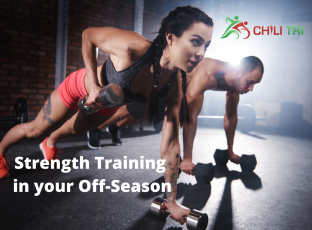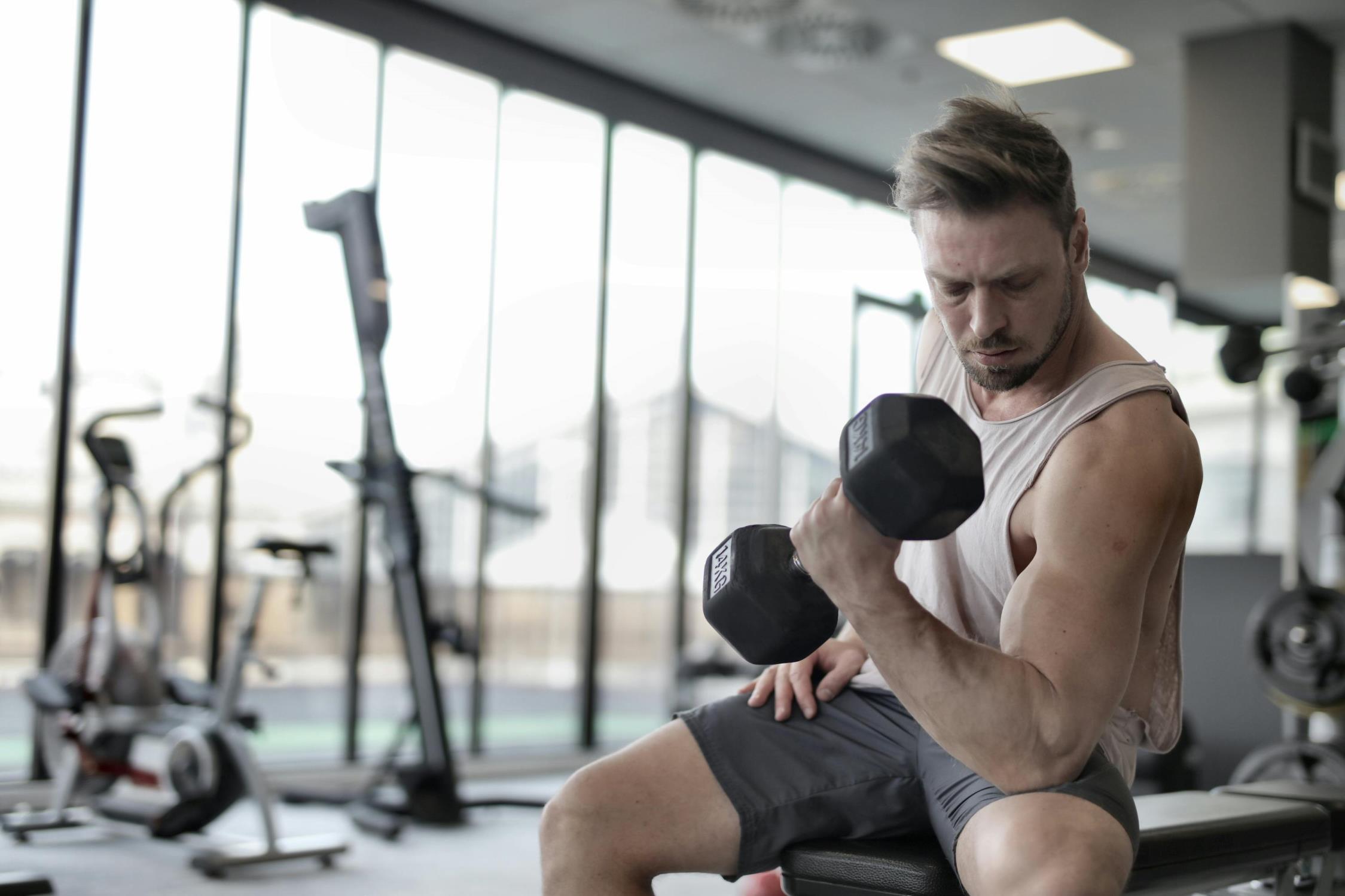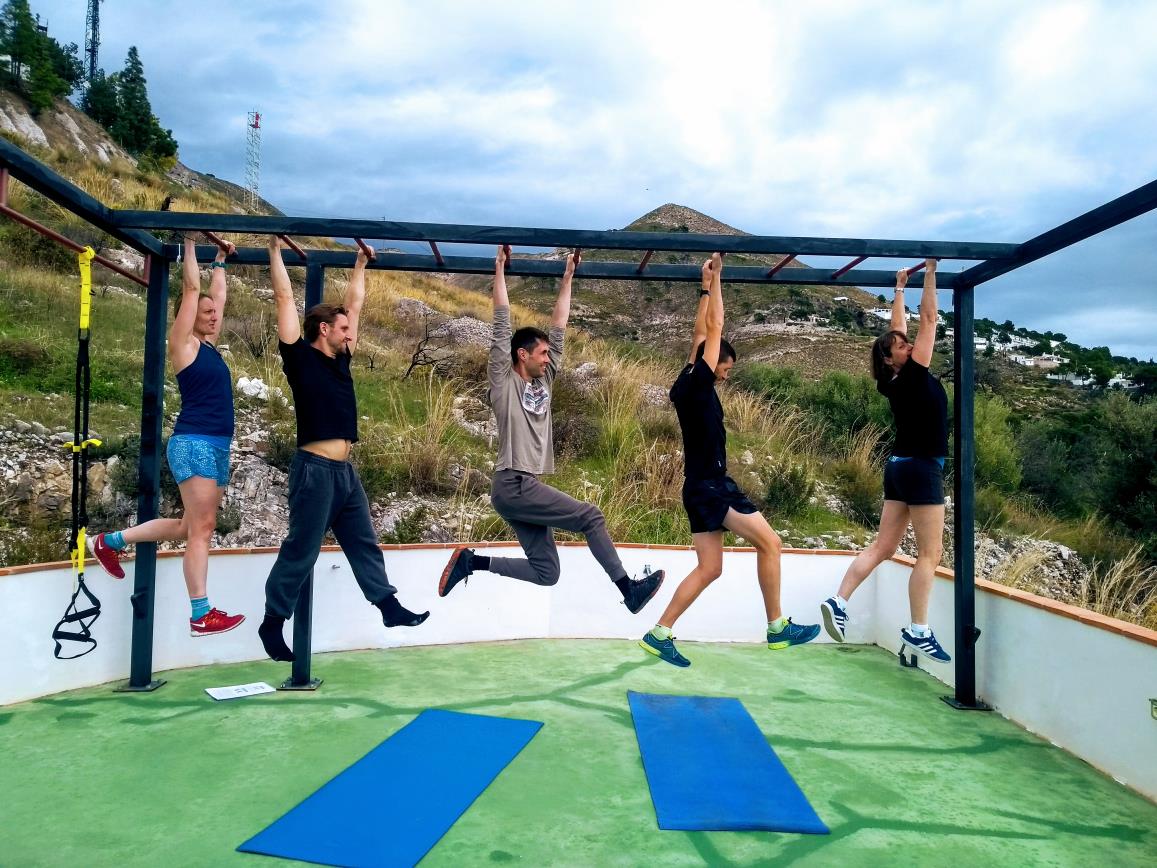Strength Training in your Off-Season
 Karen Parnell
November 12, 2021
Karen Parnell
November 12, 2021

Strength Training in your Off-Season
The off-season is a strange and sometimes confusing time for athletes. Do you take it easy? Do you do nothing and do all the things you missed out on when training for your A race? or do work on an area you found lacking on race day?
Everyone is different and depending on your season you may feel you need time off from swimming, cycling and running and try out a new hobby like rock climbing, a racket sport, extreme frisbee or may be even golf.
Some athletes choose to work on a technical weakness like cycling descending skills or swimming technique and some decide to work on their overall strength.
Taking a break from swimming, cycling and running may be a good idea so that when you start on your base phase you will feel refreshed and simply raring to go!

Get your FREE Guide to Strength and Conditioning
The Benefits of Resistance Training
Resistance training is a major component for progression in athletic performance. Although the best way to improve performance would be to practice the skills specific to your sport (specificity), resistance training allows you to target certain muscles/muscles groups relevant to swimming, cycling and running. Strength training off the race course will help you become stronger for the demands of triathlon come race day.
Off-season resistance training is a great way to get ahead of the competition without interfering with you in-season training plan. In addition, due to its length, the off-season allows for longer periods of training for progressing specific resistance exercises. A traditional off-season resistance training program for the majority of athletes should be split in to 3 phases; Hypertrophy, Strength, and Power.
Hitting the gym may be great for some but others may like an alternative approach and prefer a little more variety and flexibility. You may prefer to workout out a home and include some Pilates or yoga and some light swimming and cycling sessions.

Photo by Andrea Piacquadio
Get your FREE Guide to Strength and Conditioning
8-Week Off-Season Strength Training Plan
If you like the sound of strength training at home then I have created an 8-Week strength training plan on TrainingPeaks which includes resistance training at home or gym, Pilates, yoga plus the option to do some light cycling and swimming. The plan includes follow along videos and exercise videos so you never get stuck.

Hanging out at the Chilitri Gym in southern Spain!
Get your FREE Strength and Conditioning 7-day plan here.
Conclusion: Make the Most of Your Off-Season with Strength Training
The off-season is the perfect opportunity to step back, recover, and rebuild—both mentally and physically. Whether you’re looking to improve your performance in triathlon, running, swimming, or cycling, incorporating strength training into your off-season routine can give you the edge you need. By focusing on resistance training now, you’ll lay the foundation for increased power, endurance, and injury prevention when your race season kicks back into gear.
Remember, off-season training doesn’t have to be rigid or boring. Mix things up with home workouts, Pilates, yoga, or even low-intensity cardio to keep things fresh and fun.
Ready to get started? Download your FREE Guide to Strength and Conditioning today and build a stronger, more resilient you—just in time for your best season yet.
Karen Parnell is a Level 3 British Triathlon and IRONMAN Certified Coach, 8020 Endurance Certified Coach, WOWSA Level 3 open water swimming coach and NASM Personal Trainer and Sports Technology Writer.
Karen is currently studying for an MSc in Sports Performance Coaching at the University of Stirling.
Need a training plan? I have plans on TrainingPeaks and FinalSurge:
I also coach a very small number of athletes one to one for all triathlon and multi-sport distances, open water swimming events and running races, email me for details and availability. Karen.parnell@chilitri.com
Get your FREE Guide to Running Speed and Technique
Get your FREE Swim Workouts for Triathletes E-book
Get your FREE Open Water Swimming Sessions E-Book
FAQ: Strength training in the off-season for triathletes
Why is strength training important for triathletes during the off-season?
Strength training in the off-season offers several benefits for triathletes:
- Injury prevention: Strength training helps strengthen muscles, tendons, and ligaments, reducing the risk of overuse injuries common in endurance sports.
- Improved performance: Building strength and power enhances performance across all three disciplines of triathlon. Stronger muscles can generate more force, leading to increased speed, efficiency, and endurance.
- Enhanced muscle balance and stability: Strength training helps address muscular imbalances and strengthens stabilizer muscles, which can improve technique and prevent compensation patterns that may lead to injuries.
- Increased resilience: Strength training improves bone density, joint stability, and overall resilience, making athletes more resistant to the demands of training and racing.
- Efficiency and form: Strengthening key muscle groups involved in swimming, cycling, and running can enhance technique, efficiency, and maintain proper form throughout a race.
What muscle groups should triathletes focus on during strength training in the off-season?
While individual needs may vary, triathletes should generally focus on the following muscle groups:
- Core muscles: Strengthening the core helps improve stability, posture, and power transfer between upper and lower body movements.
- Lower body muscles: Emphasize exercises targeting the quadriceps, hamstrings, glutes, and calves to improve leg strength, power, and endurance.
- Upper body muscles: Strengthening the upper body muscles, including the back, shoulders, and arms, aids in maintaining proper body position in swimming, provides stability on the bike, and assists with running form.
How often should triathletes incorporate strength training in the off-season?
The frequency of strength training sessions can vary depending on an athlete's training volume, goals, and recovery capacity. Generally, 2-3 sessions per week are recommended during the off-season. Be mindful of adequate rest and recovery between sessions.
Can strength training negatively affect endurance training?
When properly incorporated, strength training should not negatively affect endurance training. In fact, it can enhance endurance performance by improving muscle efficiency and reducing injury risk. It's important to balance strength training with triathlon-specific training to allow for proper recovery and adaptation.
Can strength training make me bulkier and slower?
The goal of strength training for triathletes is not to bulk up but rather to improve functional strength, power, and endurance. Incorporating appropriate resistance, reps, and sets can stimulate muscle adaptations without adding excessive muscle mass. Additionally, strength training can improve running economy and efficiency, leading to faster race times.
Should I use free weights, machines, or bodyweight exercises for strength training?
The choice of equipment depends on personal preference, access, and training goals. Each has its benefits:
- Free weights: They offer a wide range of exercises that engage stabilizer muscles and require coordination.
- Machines: They can be beneficial for isolating specific muscle groups and providing stability during exercises.
- Bodyweight exercises: They are effective, require minimal equipment, and can be performed anywhere. They also improve functional strength.
Should I seek guidance from a strength training professional?
Consulting with a qualified strength training professional, such as a certified strength and conditioning specialist (CSCS) or a personal trainer with experience working with triathletes, can be valuable. They can assess your needs, design a personalized program, and ensure proper form and technique to maximize benefits and minimize the risk of injury.
Remember, gradually progress the intensity, load, and complexity of your strength training program. Focus on proper form and technique and listen to your body. If you experience pain or discomfort, consult with a healthcare professional.
References
Resistance Training for the Ultra-endurance Athlete - NASM
